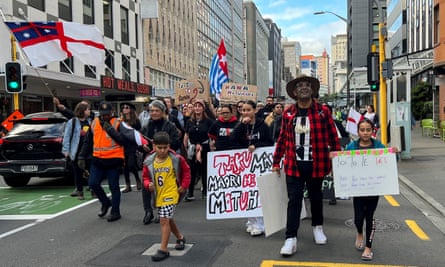New Zealand’s new government can expect quite the welcome next week at Waitangi, the tranquil northern bay where the country’s founding document was signed 184 years ago.
Outraged by the government’s proposals to drastically unwind policies that support Māori and to review the country’s founding document, the Treaty of Waitangi, Māori have galvanised across tribes and movements in a way not seen in decades. Some of the government’s attempts are already being challenged in the courts, and given the level of opposition from well-funded Māori organisations, the list of challenges will grow.
The year started when 10,000 people rumbled into the small town of Ngāruawāhia to attend a meeting called by the Māori King. They came from all tribes, from all corners of the country. Some by bike, some even by horseback, red and black Māori flags hoisted high.
The Māori King movement is not universally followed, and it’s been involved in bitter disagreements with some tribes in recent years. So the fact that tribes that aren’t part of the movement also gathered in such numbers was a stunning display of the depth of feeling.
Prime minister Christopher Luxon, with deputy prime minister and New Zealand First leader Winston Peters and Act leader David Seymour, have signed to a coalition that will either repeal or review at least a dozen Māori-related policies. It includes abolishing the Māori Health Authority, set up to address appalling health disparities, and rolling back the use of the endangered Māori language, te reo Māori, in government departments. The government says the moves are about clearing “confusion” around bilingualism, and making policy based on need, not race.
The Act party’s proposal to review the principles of the Treaty of Waitangi has perhaps drawn the most anger. Signed in February 1840, it was an agreement between Māori and the British Crown. It offered the Crown a chance to form government and to make a home. But importantly, it guaranteed continued self-determination for Māori.
It didn’t take long for the Crown to break its promises, when wars of conquest were being waged down the North Island. Tribal structures were eroded, and the language suppressed. But Māori never forgot the promises. Right through the 19th century they fought and petitioned for the treaty to be honoured. In the 20th century, searching for a national image detached from Britain, the idea of “celebrating” Waitangi Day as the birth of New Zealand emerged.
The pumped-up ceremony came up against a generation of disenchanted young Māori. Called Ngā Tamatoa, the young warriors, they picketed every Waitangi Day through the 1970s and 1980s demanding the government honour the Treaty of Waitangi.
That effort was a large part of the “Māori renaissance”, which led to policies to enshrine Maori language. It saw the establishment of a Waitangi Tribunal to investigate and address Crown transgressions. In the late 1980s, the court of appeal released a landmark decision upholding the “principles” of the treaty. These principles – known colloquially as partnership, participation, and protection — became a helpful force in the treaty settlement process to settle historic wrongs, which has involved apologies, financial redress and, in some cases, the return of Crown-held land or co-governance arrangements.
But the principles don’t resemble the text of the treaty, they’ve developed as something of a compromise. Still, they’ve woven their way through settlements, legislation, court rulings and the fabric of New Zealand society over the past three decades. These are the principles many Māori are concerned the coalition policy threatens to undo.

There have already been marches in major cities and a large gathering is planned for Waitangi Day. But the resistance isn’t just on the streets. After nearly 30 years of a treaty settlement process between tribes and the Crown – backed by both National and Labour governments – tribal organisations are now powerful billion-dollar entities ready to litigate. In December, Waikato-Tainui filed a high court case against the government’s plan to roll back the use of Māori language, claiming it breaches the terms of its settlement. Ngāi Te Rangi has filed a claim with the Waitangi Tribunal over the language policy. Another organisation has filed a claim over the plan to abolish the Māori Health Authority. A challenge over the treaty principles bill is almost certain.
After the meeting called by the Māori King, Luxon has been softening his words, now saying his party was only committed to taking the treaty principles bill – which could ultimately put Indigenous rights to a referendum – to a select committee. His coalition partner Seymour still believes he can garner the support to see it through. But this is only one policy, attempts to roll back other Māori policies are under way.
Waitangi Day is always an interesting contrast. The tree-lined bay plays home to special ceremonies and carnival-like events. But it’s also where uncomfortable questions of sovereignty, inequality and the reach of history are confronted. Most importantly, Waitangi is also one of the few places where politicians are held accountable to Māori at their place, on their terms, according to their custom.
Jamie Tahana (Te Arawa/Ngāti Pikiao) is a Māori journalist and broadcaster